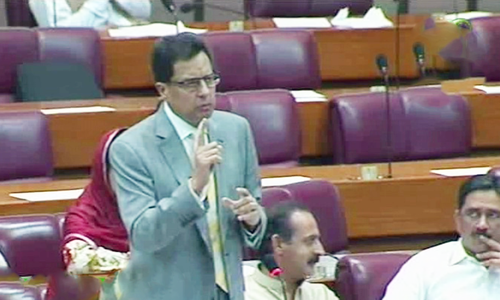It was a diatribe both repugnant and dangerous, not only in what was said but also in terms of its wider ramifications.
On Tuesday in the National Assembly, retired Capt Mohammed Safdar, having just secured bail from an accountability court, launched a vociferous attack against the Ahmadi community, describing them as a “threat to this country” and demanding that its members be banned from induction into the government and military service.
He also called for Nobel Laureate Dr Abdus Salam’s name to be delinked from Quaid-i-Azam University’s physics department, which has recently been renamed — by his own father-in-law, the former prime minister Nawaz Sharif — in honour of the celebrated Pakistani scientist.
The MNA’s words are a repudiation of history, and if his prescription — that of faith as a condition of military recruitment — were to be put into practice, it would imperil our future as a nation. Many officers belonging to minority faiths have served this country with distinction; to name but a few, Group Captain Cecil Chaudhry, retired Major Gen Maneck Sopariwala and Wing Commander Mervyn Leslie Middlecoat. Some, such as the latter, and more recently army sepoy Lal Chand Rebari, have laid down their lives in the line of duty.
Merit alone must determine the composition of the armed forces; any other consideration would fatally compromise its professionalism and its capacity to defend the country’s borders. To its credit, Pakistan’s military leadership has consistently resisted any attempt to create communal or sectarian divisions within its ranks. To demand otherwise is to run counter to that pragmatic approach.
Not only that, Capt Safdar’s tirade — one that any violent extremist would be proud of — clearly violates the country’s hate speech laws as well as the objectives of the National Action Plan. The concept of inclusivity that our leadership is supposedly promoting as an antidote to intolerance in society brooks no exceptions.
However, when the floor of the assembly was being used to spew invective against a minority community, the people’s representatives could only watch in craven silence, sometimes even thumping their desks in approval. Despite their lofty claims of countering religious extremism in all its forms, not one legislator had the spine or decency to object.
Until all Pakistani citizens are deemed equal before the law, until patriotism or the right to security of life and property is not contingent upon faith, aspirations for a more peaceful polity will remain a pipe dream.
Published in Dawn, October 12th, 2017














































